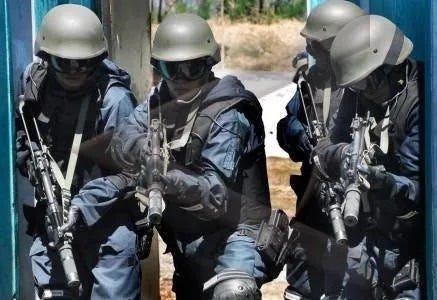Four terrorists nabbed in Indonesia; 94 Indonesian overseas workers deported due to terrorism
The four were allegedly linked to Daesh.

JAKARTA: The arrest of four terror suspects in Indonesia and the deportation of 94 Indonesian overseas workers due to terrorism involvement are part of SEA MILITANCY’s latest Southeast Asian terrorism roundup from last week.
Indonesia’s counterterrorism force Densus 88 arrested the four suspected terrorists on Nov. 21 in Dumai and Rokan Hulu, Riau province, in Sumatera, said its spokesman Aswin Siregar on Nov. 22.
Indonesian National Police’s spokesman Ahmad Ramadhan identified the four suspects using their initials, MK, MI, D and M. Many Indonesians only have one name.
Ramadhan said that the suspects MK and MI were on a wanted list who in 2022 had planned to carry out terror attacks against police in Riau’s Dumai city.
"Suspects MK and MI have been members of the group RQ Jabal Noer since 2014 and are members of the RP group who in September 2022 wanted to carry out amaliyah against Dumai police," he explained, using the Indonesian and Arabic word for terror attacks.
Ramadhan further explained that suspect D, who was also part of the group, also planned to carry out acts of terror against Dumai police.
"Suspect D is a sympathiser of [Jamaah Ansharut Daulah] and is an RP group member who wanted to carry out amaliyah against Dumai police in September 2022," he said.
Meanwhile, suspect M’s role was to spread propaganda on social media to disrupt the implementation of the 2024 election until that year’s Christmas and the 2025 new year.
"Suspect M carried out propaganda on social media to create chaos in the 2024 elections and together with Mr. S to make Christmas and New Year amaliyah plans," Ramadhan concluded.
Pro-Daesh JAD was responsible for a series of recent suicide bombings at churches and police headquarters in Indonesia as well as at a church in Sulu, southern Philippines.
The 94 Indonesians were deported while working overseas this year, said an official of the National Counterterrorism Agency (BNPT).
BNPT’s principal secretary Bangbang Surono said that the 94 Indonesians were working in a number of countries, mostly, or 45 individuals, in Singapore.
"The others who were exposed to terrorism were 21 in South Korea, eight people in Japan, seven people in Hong Kong, four people in Brunei Darussalam, four in Taiwan, two in Malaysia, two in Saudi Arabia, one in Thailand and one in the United States," said Bangbang on Nov. 21.
Bangbang said the 94 deported, including 41 women, reflects 0.04 percent of the total of 244,989 Indonesian workers abroad.
The official advised Indonesian overseas workers to protect themselves against radicalisation.
Meanwhile, a security agency in the Malaysian Borneo state of Sabah has been alloctad RM20 million (AED15,809,549) to boost its border tactical assets to secure the state’s east coast against threats including the transborder movement of terrorists and transborder maritime kidnapping.
The CEO of the Eastern Sabah Security Command (Esscom), Dr. Jamaluddin Mohamad Ali, said he hoped the acquisition of assets, which included speedboats, could be realised by next year.
Assistant Minister to the Chief Minister of Sabah, Nizam Abu Bakar Titingan, said Esscom’s plan to improve the operation and control capabilities of the security forces is in line with the state and federal government's aspiration to boost the country's economy.
“The plan by Esscom, includes the acquisition of tactical assets, like a floating boat (barge) in Aji Kuning River, Sebatik Island…and a number of Rigid Hull Inflatable Boats or speedboats, to be placed in strategic locations along the coast and waters of Tawau district,” Nizam said on Nov. 24.
“This is apart from establishing a sea checkpoint on Sebatik Island against non-conventional ships called ‘kumpit’ that carry out barter trade and transhipment activities, as well as the establishment of another battalion of the General Operations Force (PGA) to strengthen the security forces' control capabilities at the country’s border with the Philippines and Indonesia.”
The PGA is the police’s paramilitary wing.
Eastern Sabah’s waters were a hotspot of maritime kidnapping by the Abu Sayyaf terror and transborder criminal group from Sulu.
Eastern Sabah also was used as a transit point by foreign terrorists en route to the southern Philippines.
In 2013, militants from Sulu intruded into part of eastern Sabah to stake their historic territorial claim over part of Sabah, resulting in weekslong bloody clashes that killed 10 Malaysian security members and dozens of Sulu militants.
After the incident, Esscom was formed and eastern Sabah was designated as the Eastern Sabah Security Zone, recently renamed as Eastern Sabah Safety Zone, that entails a night curfew in certain maritime areas.
Maritime kidnapping has been reduced since the formation of Esscom and the last incident occured in January 2020.



